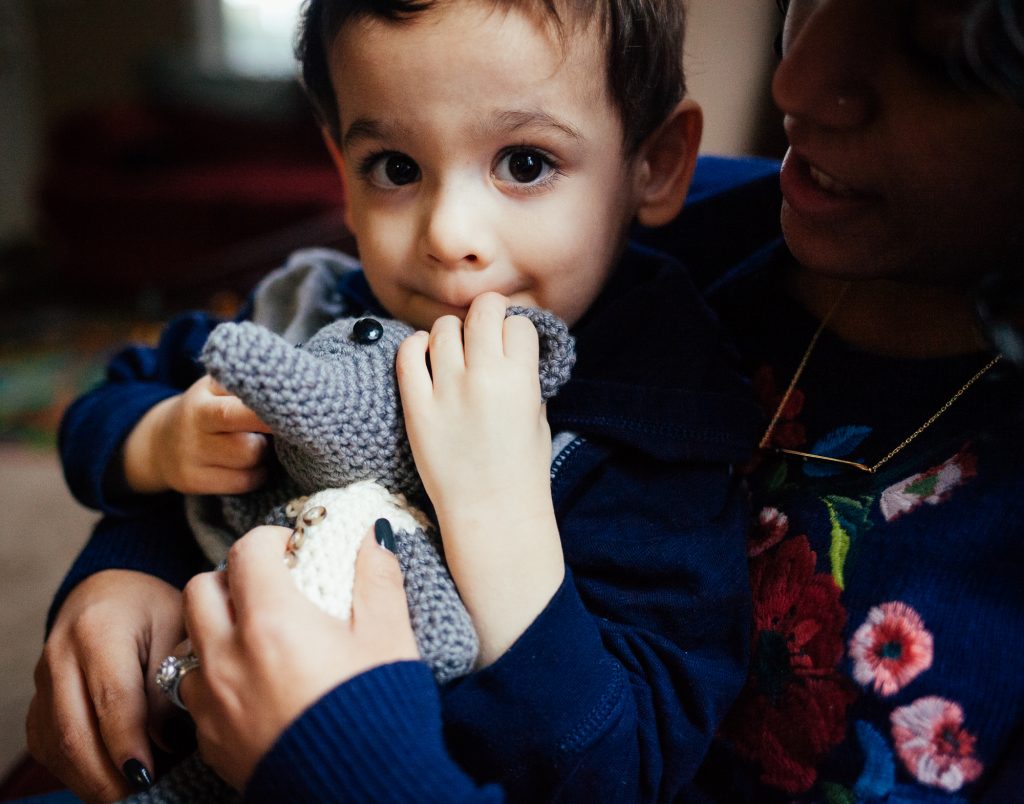
Family History
Sohini’s family’s story of how they came to Britain began a long time ago during her grandfather’s early adulthood. The British had colonized India and were recruiting Indian people for all types of work. Sohini’s grandfather could speak and write English, so they hired him as a clerk and sent him to Kenya to work on the construction of a railroad. All eleven of his children, including Sohini’s mother, were born in Africa with British citizenship.
Childhood
Sohini’s father was born in India and met her mother through their arranged marriage. Sohini was born in Hounslow, a suburb outside of London. She and her brother grew up surrounded by an extensive support system of 15 cousins. They went to school and temple together and visited each other’s houses all the time. Sohini even thought some of her cousins were her brothers and sisters.
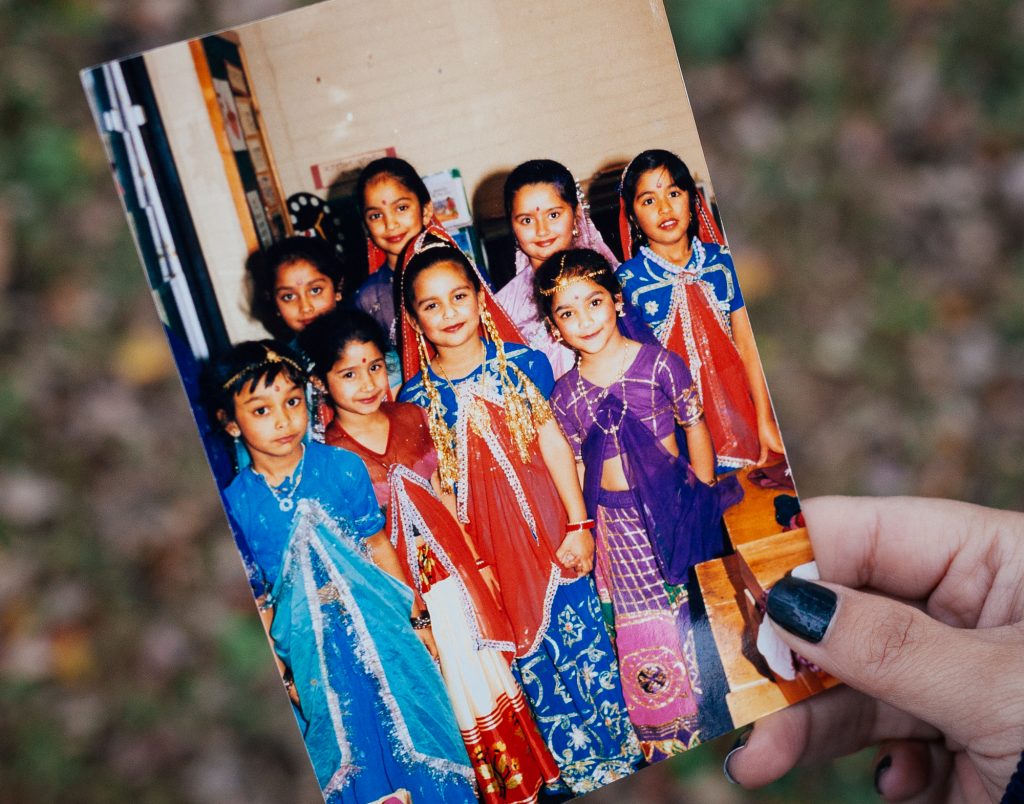
Above: Sohini (wearing purple on the bottom right) in Gujarati attire with her cousin and friends for a folk dance competition in England.
Sohini’s parents worked in London, and the family was “getting by” at best. Her father had a factory job, and her mother worked at the elementary school as the supervisor of all the “dinner ladies” (the women who would make sure the children ate their lunch).

“Everywhere we went we kind of adopted a little British granny. This is Violet holding me [photo below]. My mom worked two jobs, so Violet would help us out. She lived in the same government housing building as us and made the best homemade shoestring french fries.”
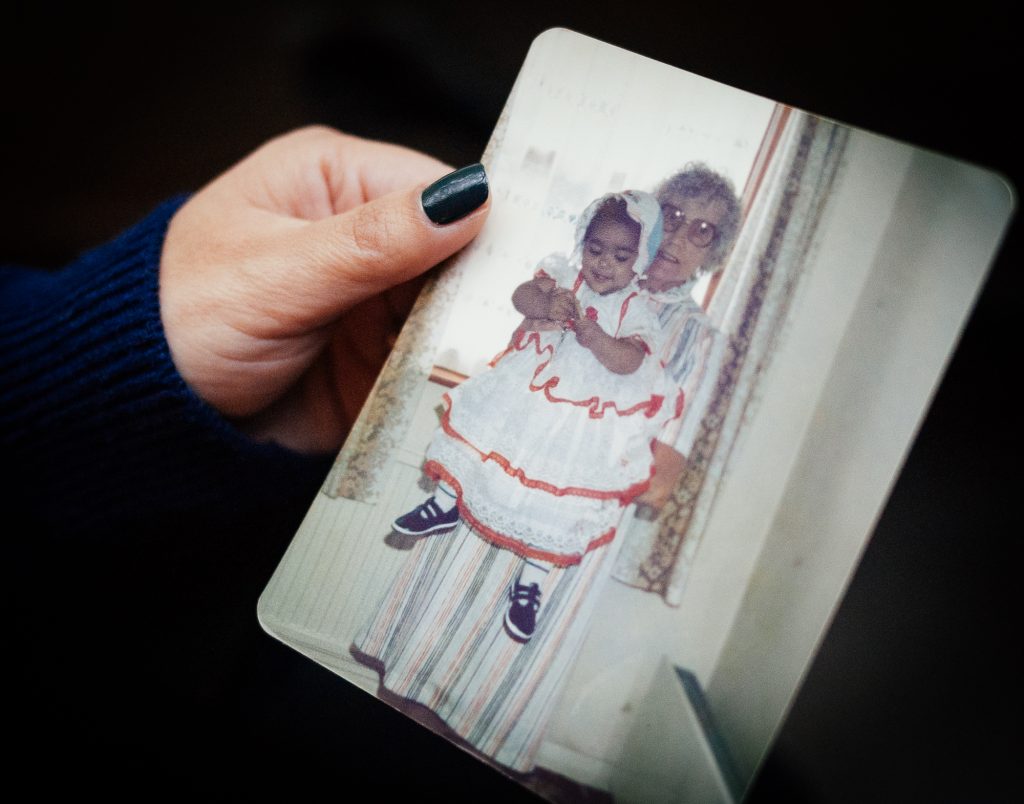
South Wales
The family made a move to South Wales when Sohini was six years old to see if they could have greater economic success. Her parents decided to buy a corner shop in a predominantly Welsh area with some Jamaican immigrants, but no Indian people.
“I was kind of uncomfortable when we first moved there because there wasn’t anyone who was Indian – a few kids were Pakistani. I didn’t fit in, I got bullied, and I will never forget this: They gathered around me, and there’s a song called “brown girl in the ring” – it goes something like this [sings the song]” (audio below)
Sohini did make friends at school eventually, and she does have some positive memories from Wales, especially the field trips to see castles and museums. She has always loved history – anything Medieval or Victorian. Throughout their time living in South Wales, her family took every opportunity to go back to London to visit their extended family.
Art
Sohini loved making art from an early age, but never felt supported with this passion.
“I wasn’t encouraged by parents to pursue anything in art. It had to be stable and where I could make a lot of money. They kept pushing me to be a doctor or a lawyer like most Indian parents.”
While in Wales, Sohini remembers her art teacher encouraging her and telling her she was a talented painter. Even with this encouragement, Sohini hasn’t picked up a paintbrush since then.

Crochet
Crocheting is a form of art her parents encouraged. Sohini’s grandma crocheted, taught it to her mom, who then taught Sohini while at the corner store. Since she wasn’t allowed to go out like her brothers were, Sohini had to find something to pass the time. The boys had “free reign”, something that Sohini says is common in Indian families.
She especially loves the rhythm of crocheting.
“Once you read the pattern and get it in your head it’s just second nature. The colors and the satisfaction of making something when you get to the end of it.”
This passion has continued, and crocheting has brought her peace in stressful times.
“If I could sit at home and crochet all day, I would.” (audio below)
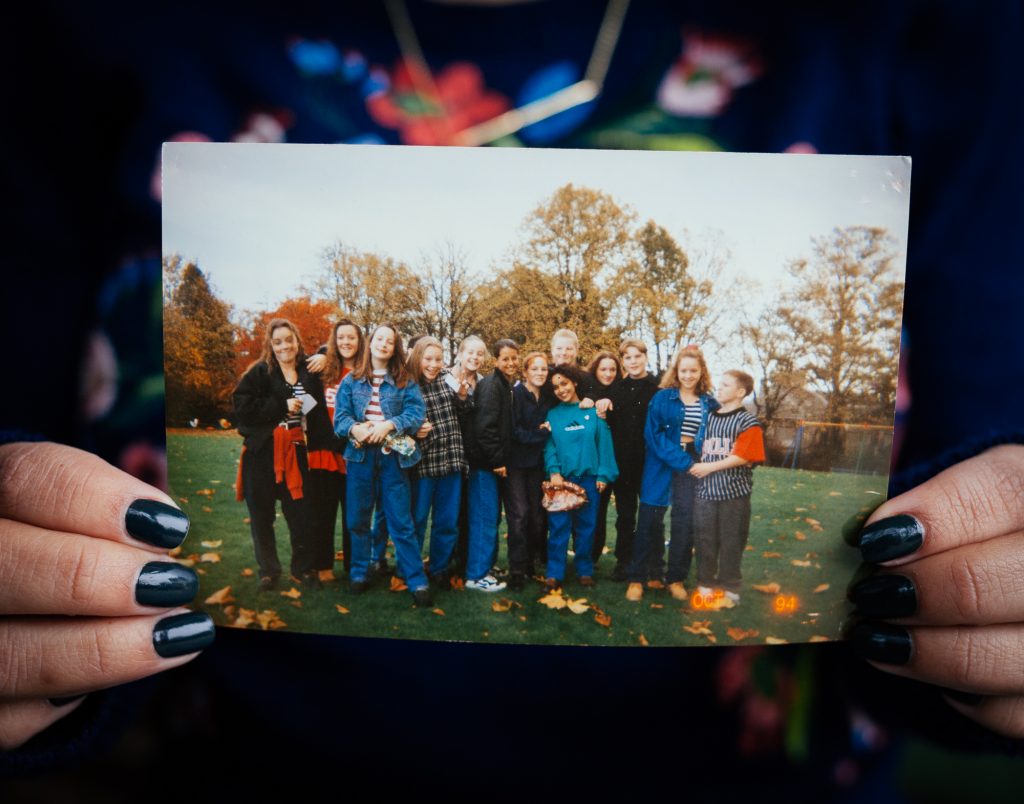
Overall the experiment of moving to Wales didn’t work out the way her parents had hoped. Sohini’s uncle was living in Atlanta, Georgia, and had submitted an application for Sohini’s parents in 1982. It wasn’t until a decade later that they got a letter from the US consulate in London saying they approved the application.
Georgia
In 1994, when Sohini was 13, they seized the opportunity to move to the United States. When they first landed in Georgia, they moved into her uncle’s two-bedroom Atlanta apartment – one family in one room, one in another.
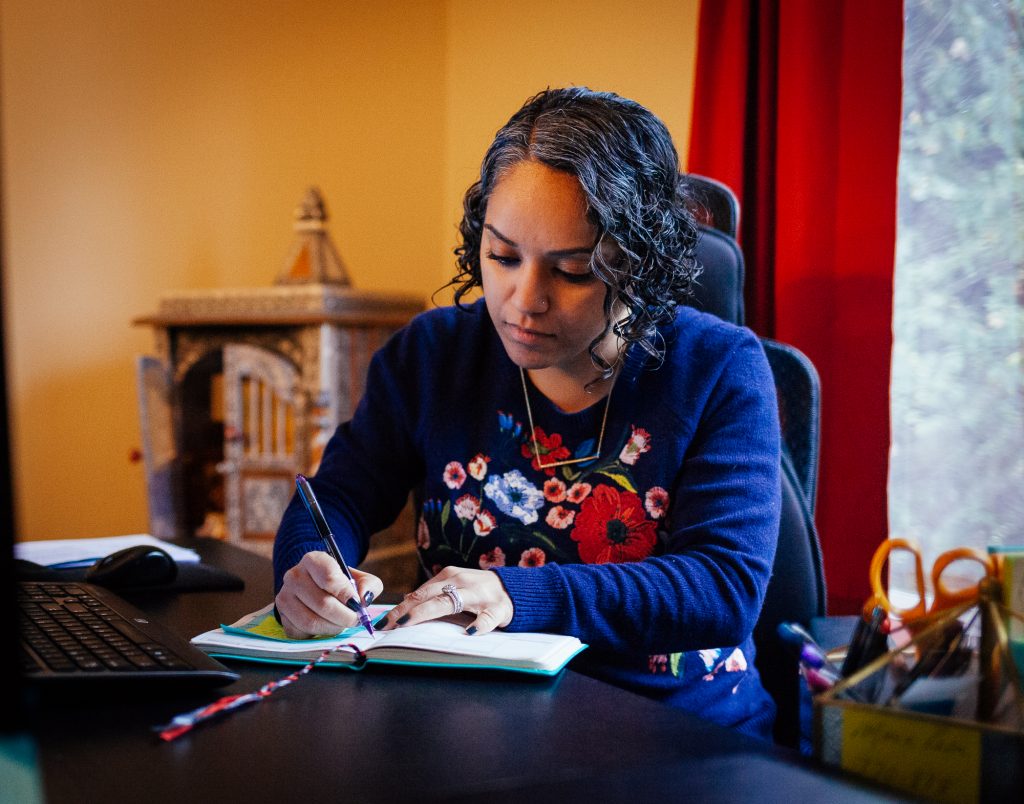
“It wasn’t a good time. I was depressed. Here we had nobody. It was a lot more expensive to call the UK from the US in the early 90s, so I wrote a lot of letters to my cousins and friends.”
She remembers how sad her mother [below] was as well. She had never been so far away from her mother and her sisters.
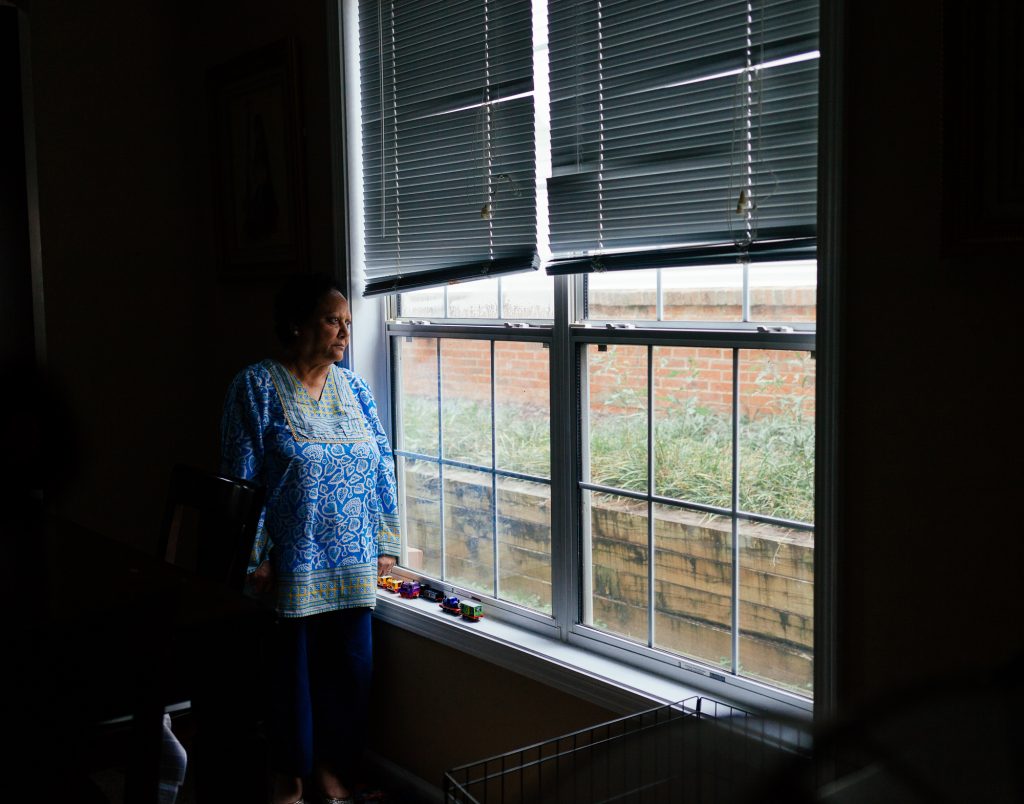
After nine months, her uncle kicked their family out. Luckily Sohini’s brother, who is good at striking up a conversation with anyone, knew the woman in charge of the apartment complex. She helped the family find an empty apartment in the same building, and slowly they filled that empty apartment with donated furniture.
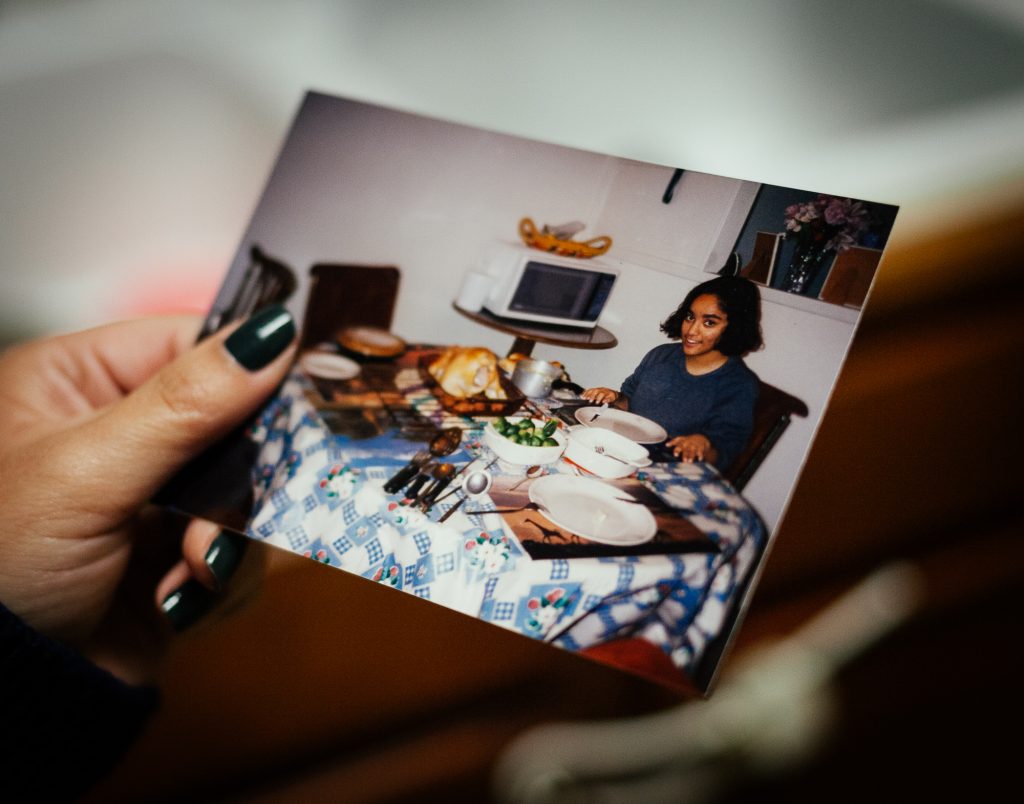
American Dream
The economic “American Dream” never materialized for her parents. Her father ran an ice cream shop for a while, and then a dry cleaner.
“My dad’s just not good at running businesses. None of them have worked.”
Sohini’s mom worked at a daycare for a while, then at KFC for more than a decade.
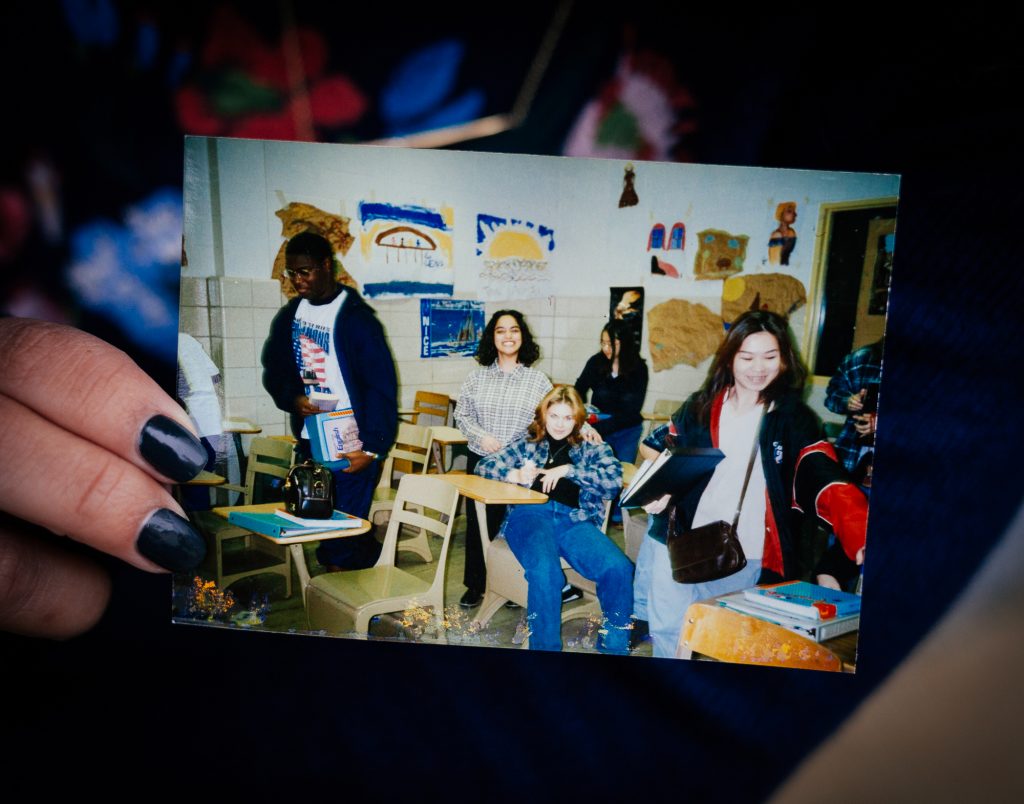
Identity
Sohini says the experience of arriving as an immigrant to Atlanta in 1994 was a “true culture shock”. It wasn’t as diverse as it is today. The people she encountered in this new country were mostly either white or black and a few were from Mexico. Sohini’s appearance and background confused people- an Indian from the U.K. who had big curly hair. They didn’t know how to place her. Sohini was regularly asked, “What are you?” or “Where are you from?” and most people assumed she was “mixed or Hispanic”.
“If I told them I was Indian, I got asked what tribe. They really didn’t know India was part of Asia. I would say I was Asian, and they would say you don’t look Asian. Lots of confusion and having to explain what I was. Add in that I was born in the U.K., and it was even more confusing”. (audio below)
On the rare occasions when she did encounter another person from India, they didn’t connect – they had different diets and a fashion sense. Most of Sohini’s friends ended up being African American or Latino.
Sohini found it strange that she had to take ESL (English as a Second Language) classes, even though English was her first language.
“We walked into this ESL class and started speaking to the teachers, and they were wondering why we were there. I was born in England. They just made us read books and do book reports.” (audio below)
From Sohini’s memory, the 1996 Summer Olympics seemed to change the culture of Atlanta. These games exposed people to other religions and cultures, and backgrounds. After the Olympics, Sohini felt a greater sense of belonging.
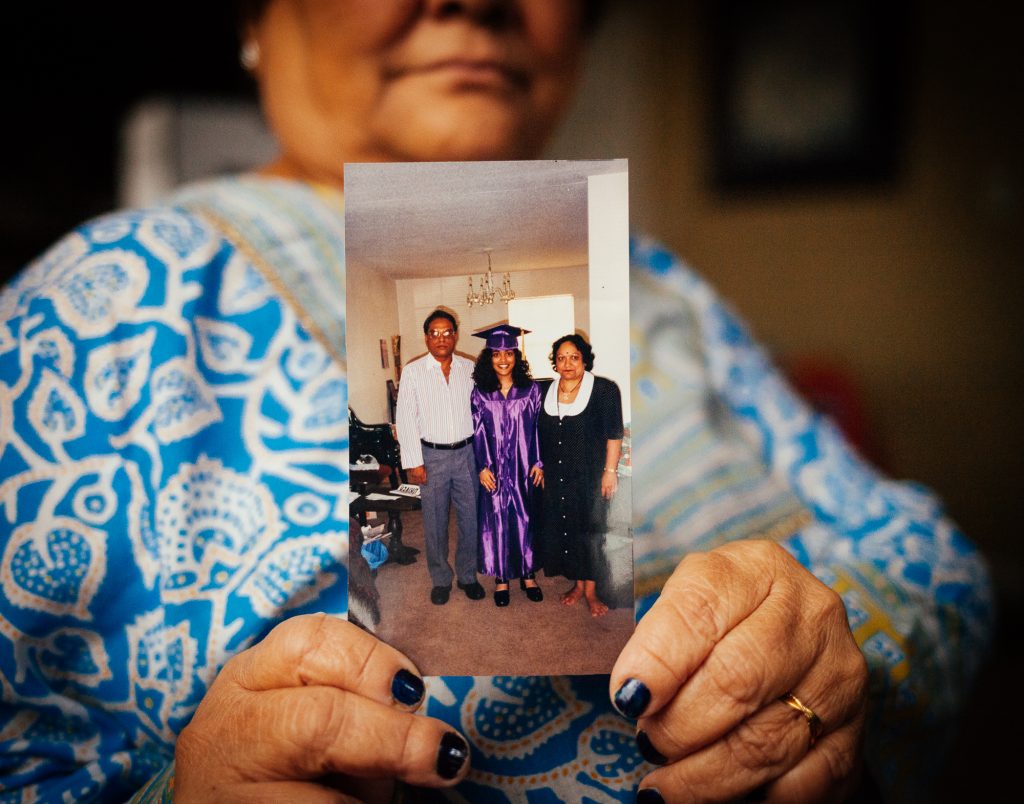
When Sohini finished high school with a high GPA and had scholarships available to her, she still decided not to go to college. Her dad wouldn’t let her move away to go to school.
“He wouldn’t let me go anywhere, so I was like ‘f-this I am going to stay at home and work.’”
Work
Sohini started working at the same daycare her mother had worked at years earlier.
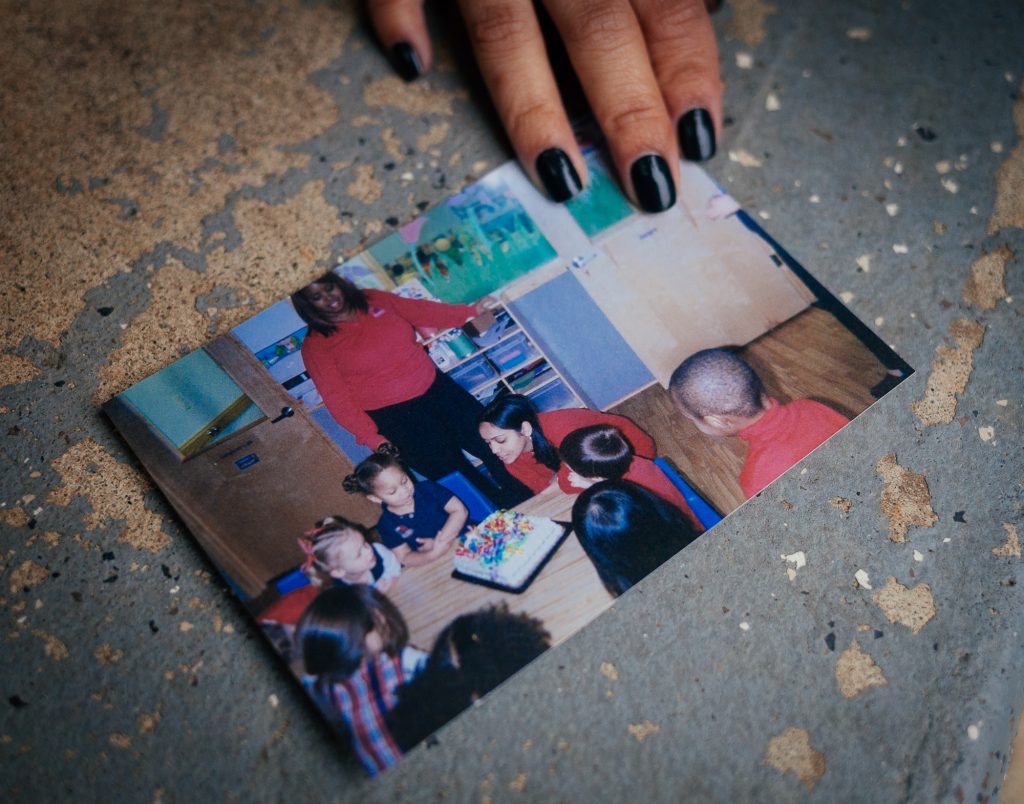
About three years later, the guy she dated at the time said he wouldn’t talk to her if she didn’t apply to college again. He wasn’t joking, and she knew he was right. Sohini thought about how her parents didn’t have more than high school education, and she knew she could succeed at the college level. Sohini started taking classes at the University of Georgia to become a teacher; then, she decided she wanted to work more in curriculum development focused on adult education.
“I could not find a job related to my career for the longest time. I’ve never found a real opportunity where I can get paid to help adults learn.”

After graduating, Sohini started writing training materials for companies and has been doing that for more than a decade. She still dreams of putting her degree to use, working with non-profit groups, and helping homeless adults learn a skill.

Meeting Michael
To graduate from the U of G, Sohini needed to take an economics class. Michael, a Georgia-native, was regularly sitting next to her. Sohini always wrote down everything the professor said, while Michael, who was confident in the subject, was skipping class and not taking notes when he was there. He eventually asked to look at her notes.
“He was like, ‘these are really detailed notes. Do you need help?’ and I was like, ‘Yes, I’m so glad you asked!’” (audio below)

Michael ended up becoming her tutor, and while she had a boyfriend at the time, they decided to stay in touch. What Michael didn’t know yet was that Sohini’s relationship at the time wasn’t healthy. She had isolated herself from her friends, who were telling her to leave this emotionally abusive partner. One night she called Michael and he listened, supported her and did not judge. They started dating and have been together for more than a decade.
Tragedy
Sohini and Michael wanted to have a child, but their journey wasn’t an easy one. Their daughter Maya was stillborn at five and a half months. It was traumatic.
They were running out of options for how they were going to have a child.
“We got into the point in our fertility journey where the doctor said that’s it. It’s not good for you, mentally or physically.”
They had sold their house and moved back in with her parents.
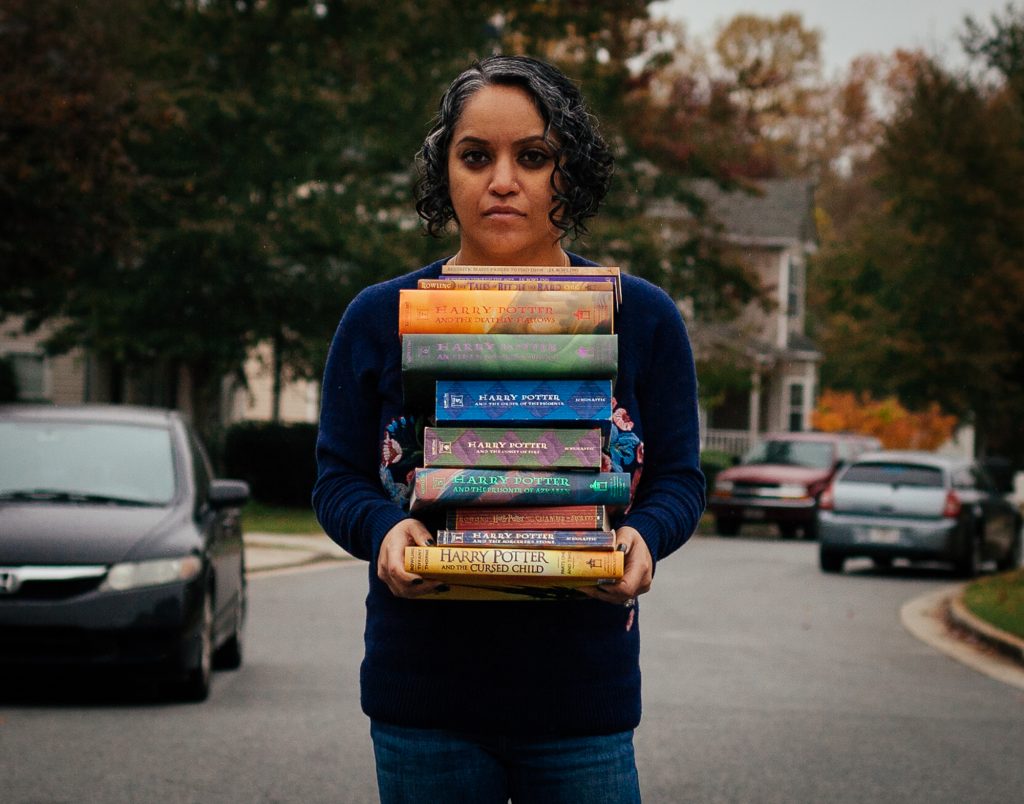
Two things that helped Sohini through all of the fertility treatments were crocheting and Harry Potter books.
“I was hooked. Every time a book came out, I got it at midnight and would sit and read it. It helped me during that period. I had distanced myself from everybody. I didn’t know who I was anymore, and I found myself again with Michael’s help, but Harry Potter kept me sane”.
Surrogacy
Michael and Sohini started thinking about adopting a child from India; then a friend brought up the idea of surrogacy. That idea stuck, and less than a year later, they were off to India to transfer Sohini’s embryo to a surrogate. The whole thing was a “whirlwind.” On their way to India to pick up their son, they stopped in London, where the family had organized a surprise baby shower.

“I just remember being so anxious. I remember looking at him through the window. This is my child.” (audio below)

“He’s a blessing. He’s a miracle. I was reading Harry Potter, and I was like, ‘oh my God, he’s the boy that lived!’ We couldn’t be happier.” (audio below)

Getting Looks
Atlanta, and Northern Georgia in general, have changed a lot since Sohini moved there. Today, Sohini would describe the area as multicultural and accepting. It still doesn’t feel that way everywhere in Georgia. Sohini remembers the first time she went to visit her cousin, who lives in the southern part of the state. “We would get looks. God forbid we stopped anywhere”!
Sohini also thinks she and Michael – an interracial couple with a mixed child – receive negative looks.
“We were in Athens [Georgia] yesterday at our favorite sushi place. As we were leaving, this woman gave me the dirtiest look and looked down at our son. I just smiled at her.”
Sohini says the Indian community can be just as bad, judging her for marrying a white guy.
“I look back at them and smile because it’s my life, not theirs.” (audio below)
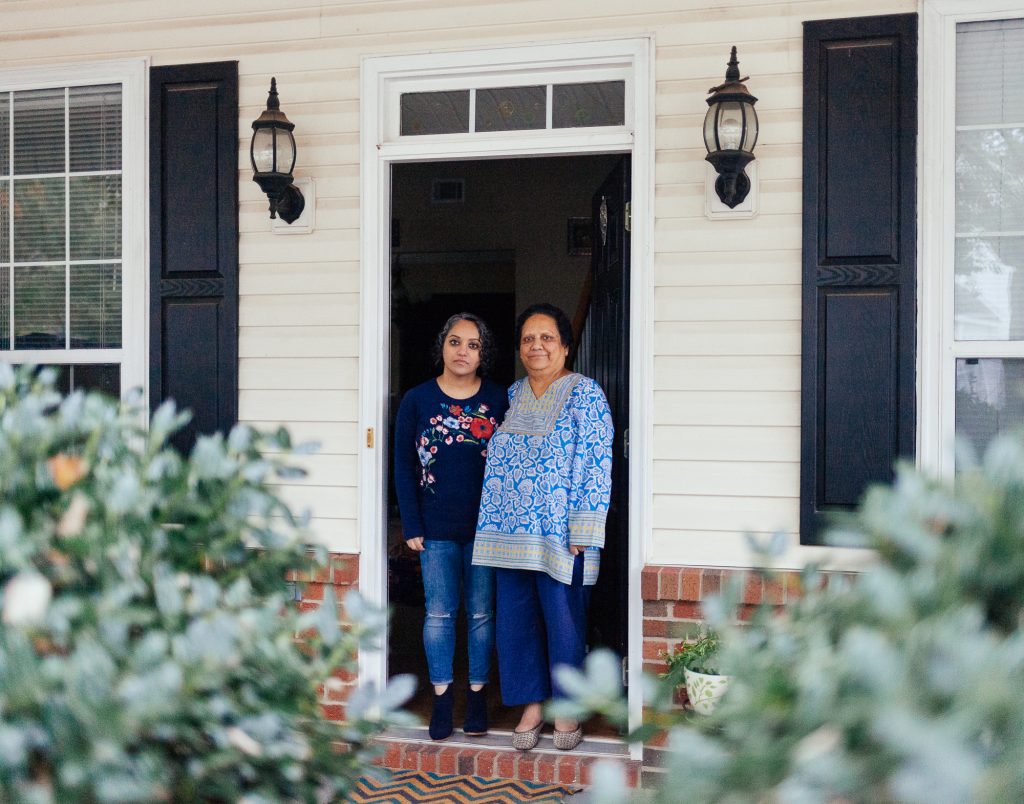

Full Circle
When Sohini went to India on vacation, she was able to visit her family’s ancestral home. On the front porch, she found this sewing machine [see the above photo]- the one her mother and all of her sisters learned to sew on. Sohini brought it back to Georgia.
Sohini isn’t sewing often, but she continues the family tradition of crocheting with a passion. She recently made a turtle, a mermaid, two Star Wars hats, and a chicken hat that someone ordered to give their granddaughter for Christmas. Sohini also made her son, ‘the miracle boy that lived’, an elephant.
#FINDINGAMERICAN
To receive updates on the book release and exhibition of “Finding American: Stories of Immigration from all 50 States” please subscribe here. This project is a labor of love and passion. If you would like to support its continuation, it would be greatly appreciated!
© Photos and text by Colin Boyd Shafer | Edited by Janice May & Kate Kamo McHugh. Quotes edited for clarity and brevity.








